
- Subject:
- Sociology
- Material Type:
- Unit of Study
- Provider:
- Rice University
- Provider Set:
- OpenStax College





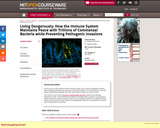
Course Description: In this course, we will examine how the immune system acts to destroy pathogenic invaders while tolerating colonization by necessary commensal bacteria. As a counterpoint, we will also explore sophisticated strategies that help some bacteria evade our immune system. This course is one of many Advanced Undergraduate Seminars offered by the Biology Department at MIT. These seminars are tailored for students with an interest in using primary research literature to discuss and learn about current biological research in a highly interactive setting. Many instructors of the Advanced Undergraduate Seminars are postdoctoral scientists with a strong interest in teaching.
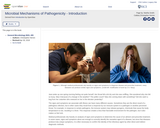
Learning Objectives in this unit:
Distinguish between signs and symptoms of disease
Explain the difference between a communicable disease and a noncommunicable disease
Compare different types of infectious diseases, including iatrogenic, nosocomial, and zoonotic diseases
Identify and describe the stages of an acute infectious disease in terms of number of pathogens present and severity of signs and symptoms
Summarize Koch’s postulates and molecular Koch’s postulates, respectively, and explain their significance and limitations
Explain the concept of pathogenicity (virulence) in terms of infectious and lethal dose
Distinguish between primary and opportunistic pathogens and identify specific examples of each
Summarize the stages of pathogenesis
Explain the roles of portals of entry and exit in the transmission of disease and identify specific examples of these portals
Explain how virulence factors contribute to signs and symptoms of infectious disease
Differentiate between endotoxins and exotoxins
Describe and differentiate between various types of exotoxins
Describe the mechanisms viruses use for adhesion and antigenic variation
Describe virulence factors unique to fungi and parasites
Compare virulence factors of fungi and bacteria
Explain the difference between protozoan parasites and helminths
Describe how helminths evade the host immune system
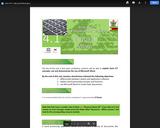
The aim of this unit is that upon completion, teachers will be able to explain basic ICT concepts, use and demonstrate the use of Microsoft Word.
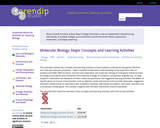
This overview reviews key concepts and learning activities to help students understand how genes influence our traits by molecular processes. Topics covered include basic understanding of the important roles of proteins and DNA; DNA structure, function and replication; the molecular biology of how genes influence traits, including transcription and translation; and the molecular biology of mutations. To help students understand the relevance of these molecular processes, the suggested learning activities link alleles of specific genes to human characteristics such as albinism, sickle cell anemia and muscular dystrophy. This overview provides links to suggested activities which include hands-on laboratory and simulation activities, web-based simulations, discussion activities and a vocabulary review game.
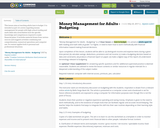
This lesson aims at teaching adults how to budget. It is intended as part of a series regarding money management for people with high-school reading and math skills who nevertheless lack the specific knowledge and competences required to make financial plans. It includes material drawn from various sources and suggests activities combining text comprehension, numerical operations and computer use. Its content applies both to personal and professional situations.
![NSU BoR RPCC Promoting Academic Success in TECH through Remediation with OER Module Integration [PASTROMI]](https://img.oercommons.org/160x134/microsite-louis-prod/media/courseware/lesson/image/Untitled_85S2shI.png)
OER Modules to support Allied Health (Nursing), Drafting, and Welding were created by RPCC faculty Dr. Esperanza Zenon, Ms. Ginny Bradley, Ms. Jesses Walzac, Ms. Donna Rybicki, Ms. Keisha Moore, Ms. Auriel McGalliard, and Mr. Elantonio McKarry. These modules were developed as part of the Promoting Academic Success in TECH through Remediation with OER Module Integration [PASTROMI] project funded by Cooperative Agreement No. NSU-FY2020-21-003 eLearning Innovations Grant Program FY20-21 between Northwestern State University and the Louisiana Board of Regents.
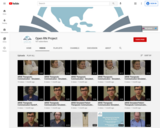
This channel contains OER media with a CC 4.0 license being used by the Open RN project. The Open RN project is funded by a $2.5 million dollar grant from the Department of Education to create 5 OER Nursing Textbooks with 25 associated Virtual Reality scenarios.
Content includes:
ARISE Therapeutic Communication - Substance Abuse
ARISE Therapeutic Communication - Sexual Orientation
ARISE Therapeutic Communication - Pediatric Separation Anxiety
ARISE Therapeutic Communication - Domestic Violence
ARISE Therapeutic Communication - End of Life
ARISE Therapeutic Communication - Cultural Competency
ARISE Therapeutic Communication - Schizophrenia Simulation
ARISE Wound Management Nursing
ARISE Pediatric Asthma Nursing
ARISE Heart Failure Nursing
ARISE End of Life Nursing
ARISE Newborn Nursing
ARISE OB Nursing
ARISE OB Simulation Nursing
ARISE Atypical Chest Pain Simulation
ARISE Typical Chest Pain Simulation







